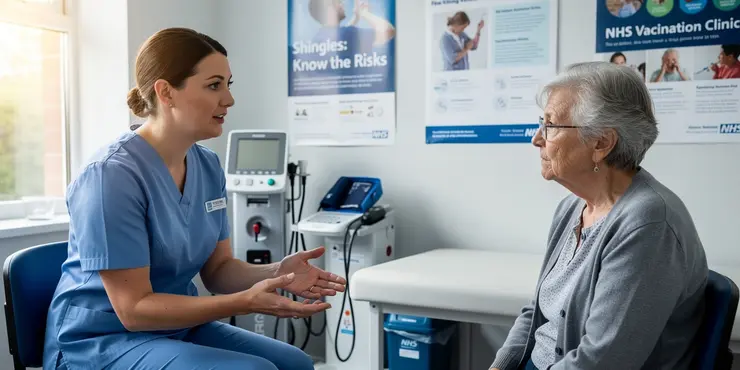
Find Help
More Items From Ergsy search
-
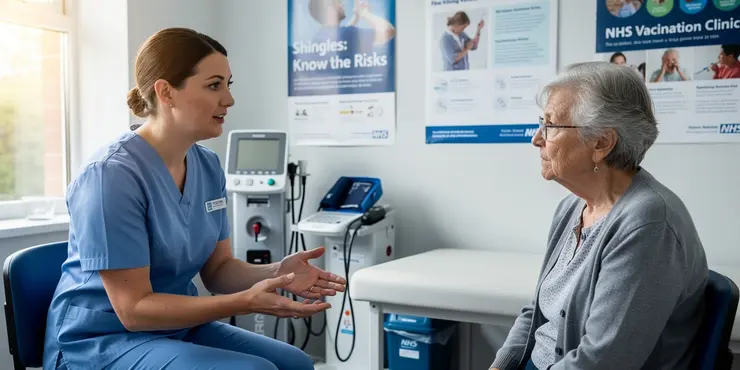
Are there any complications associated with shingles?
Relevance: 100%
-

Are there any complications associated with shingles?
Relevance: 100%
-
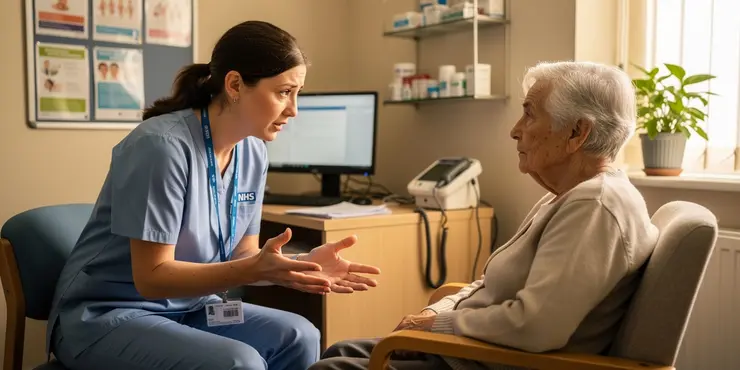
What is Shingles?
Relevance: 76%
-
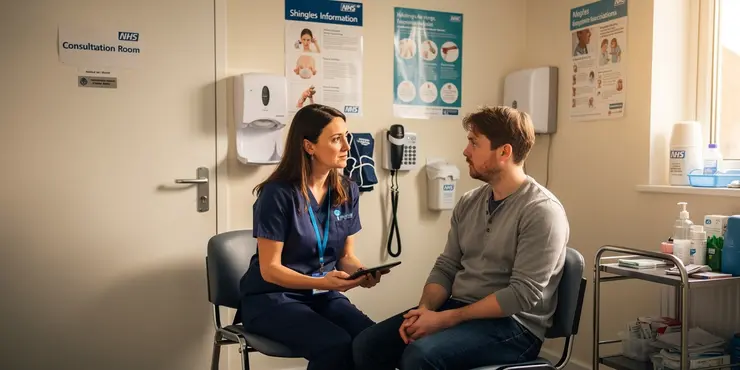
What is shingles?
Relevance: 75%
-

Is shingles contagious?
Relevance: 72%
-
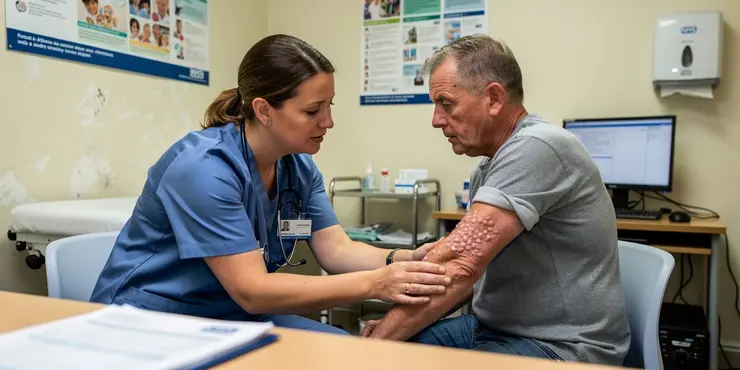
How is shingles diagnosed?
Relevance: 71%
-

What are the symptoms of shingles?
Relevance: 71%
-
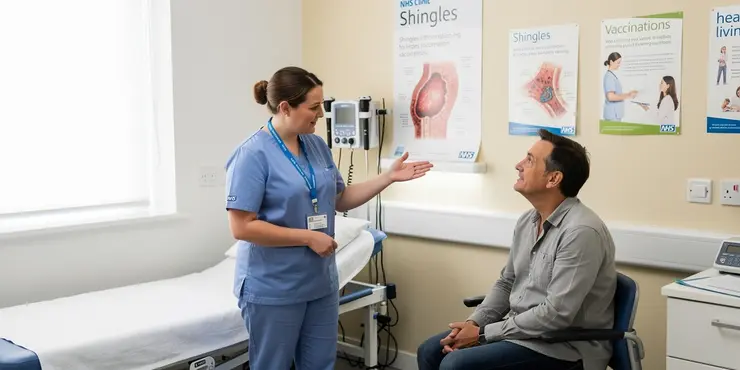
Is shingles contagious?
Relevance: 70%
-
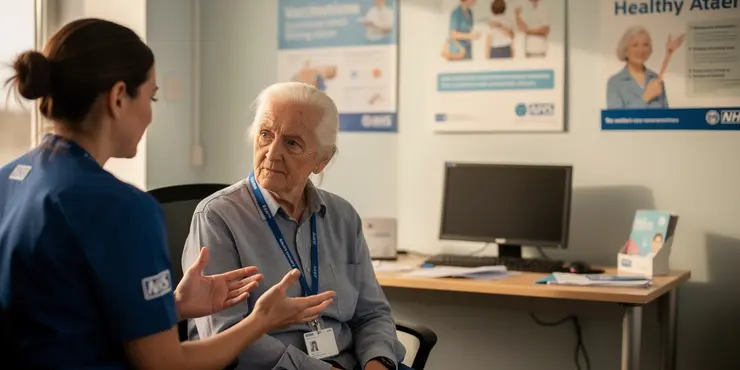
Can shingles be prevented?
Relevance: 69%
-

What treatments are available for shingles?
Relevance: 69%
-

Can shingles be prevented?
Relevance: 69%
-
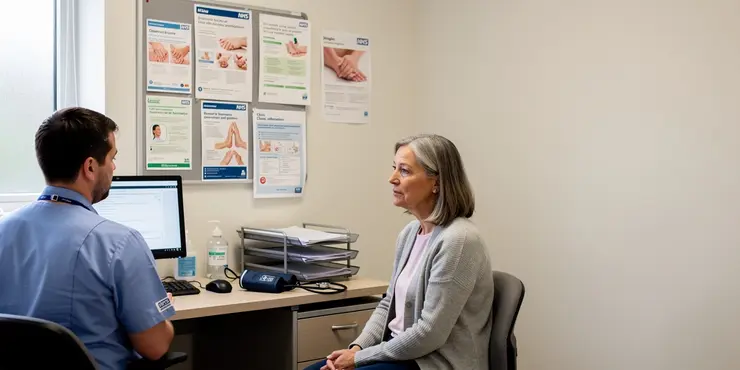
What treatments are available for shingles?
Relevance: 68%
-
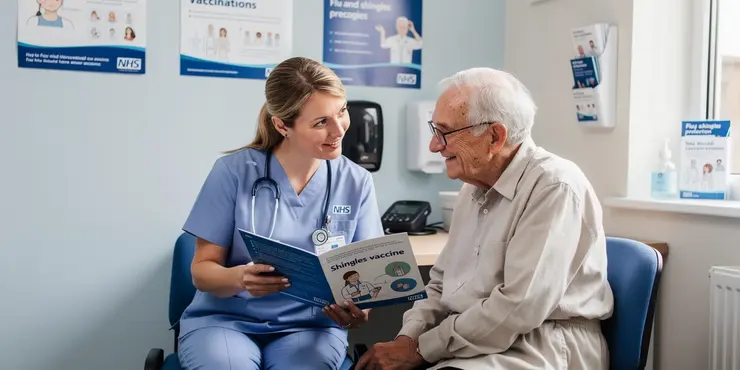
Is the shingles vaccine safe?
Relevance: 67%
-
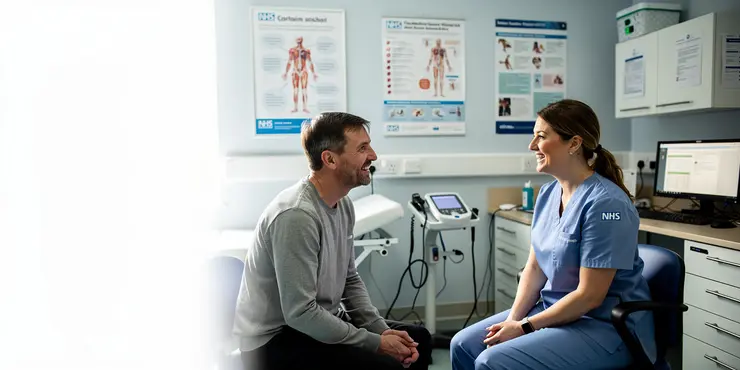
Can stress trigger shingles?
Relevance: 65%
-

Who is at risk of developing shingles?
Relevance: 65%
-

Can the shingles vaccine cause chickenpox?
Relevance: 64%
-
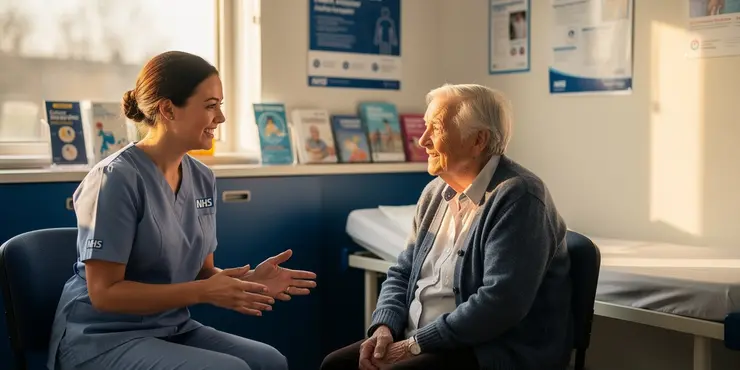
At what age should one get the shingles vaccine?
Relevance: 63%
-
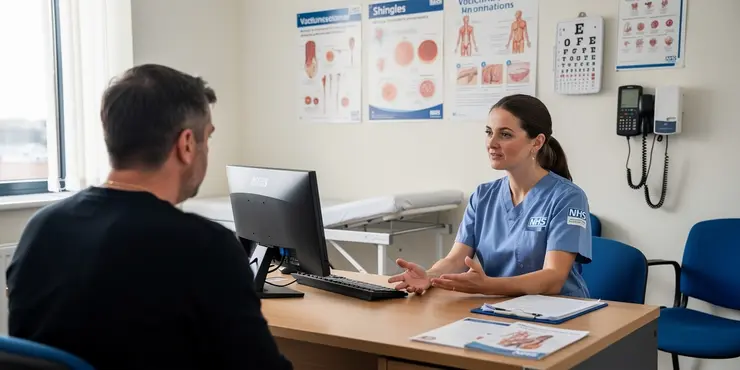
What causes shingles?
Relevance: 62%
-

What causes shingles?
Relevance: 62%
-

Can stress trigger shingles?
Relevance: 62%
-
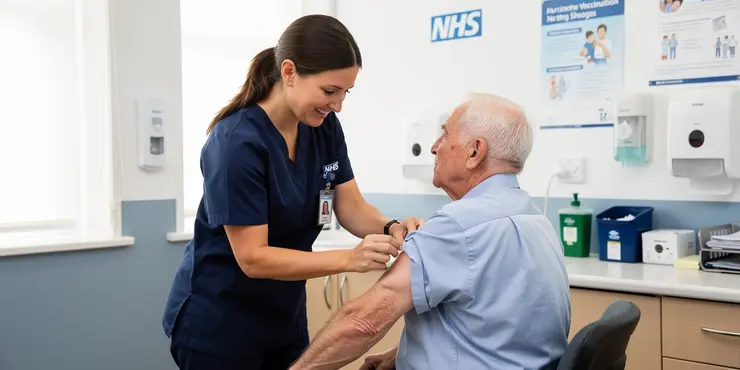
At what age should one get the shingles vaccine?
Relevance: 61%
-

Can the shingles vaccine cause chickenpox?
Relevance: 60%
-
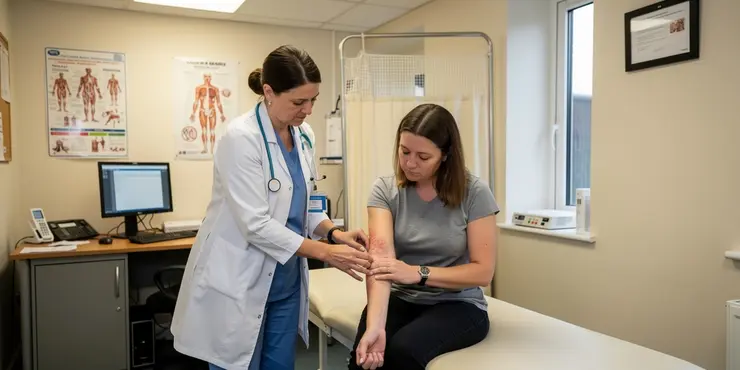
How is shingles diagnosed?
Relevance: 50%
-
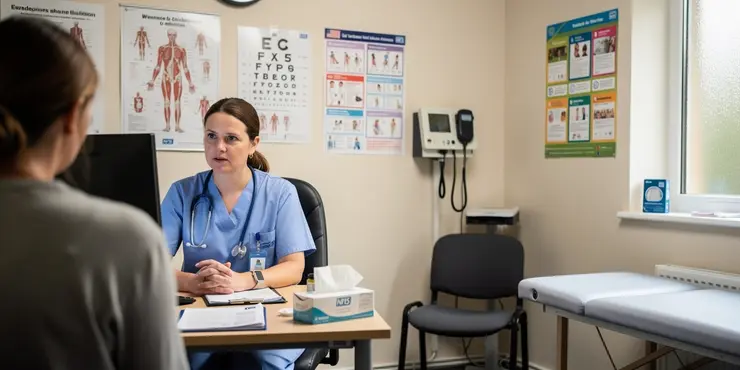
What are the complications of chickenpox?
Relevance: 47%
-

Who is at risk of developing shingles?
Relevance: 46%
-
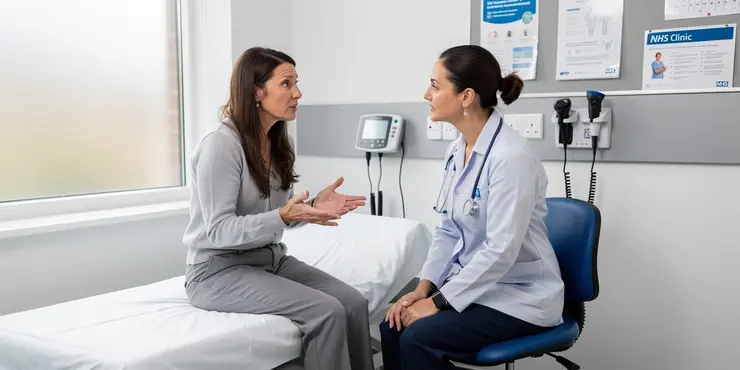
What should I do if I think I have shingles?
Relevance: 45%
-

How long does a shingles outbreak last?
Relevance: 43%
-
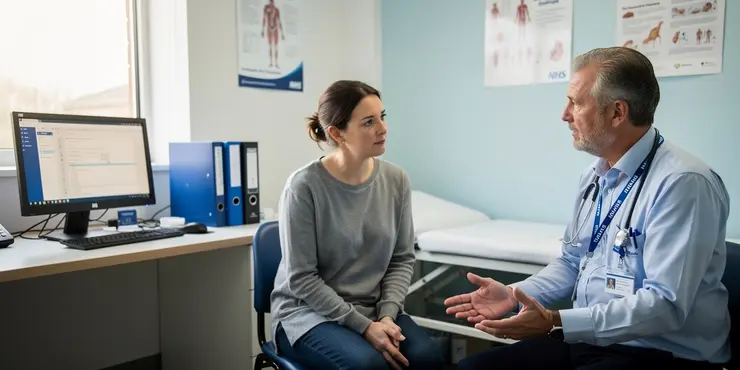
How long does a shingles outbreak last?
Relevance: 42%
-

Can measles cause complications?
Relevance: 41%
-

What are the potential complications of appendicitis?
Relevance: 40%
-

Can scabies cause complications?
Relevance: 39%
-
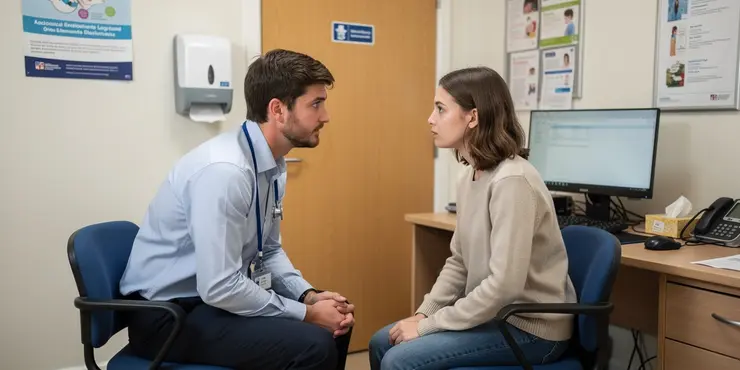
Can meningitis cause long-term complications?
Relevance: 38%
-
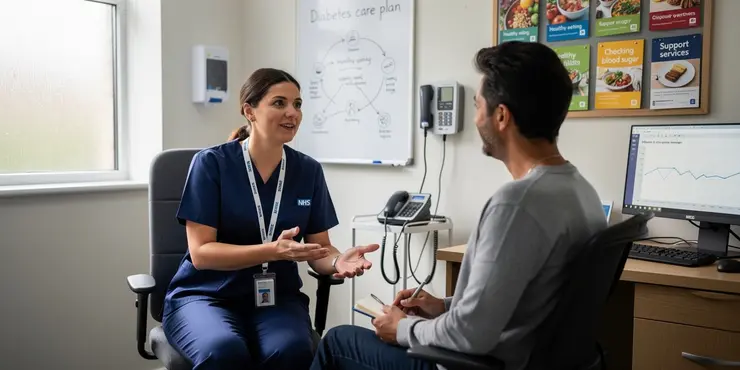
What complications are associated with Type 2 Diabetes?
Relevance: 37%
-

Are there any complications associated with Crohn's disease?
Relevance: 37%
-
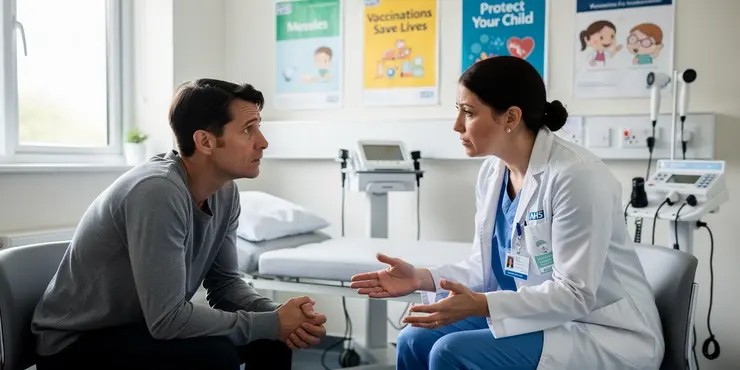
What complications can arise from measles?
Relevance: 37%
-
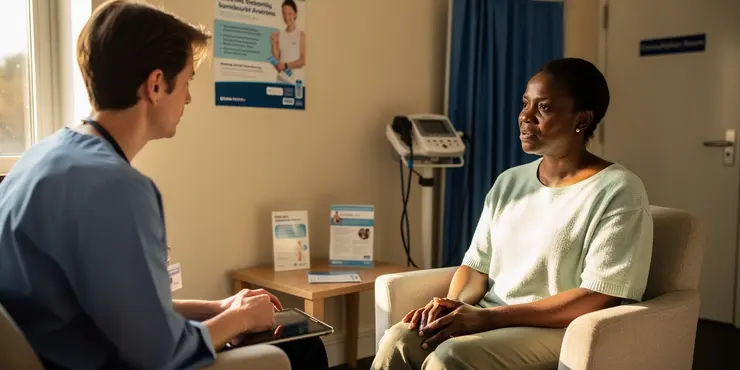
What are the complications of sickle cell disease?
Relevance: 36%
-

Who is most at risk for complications from H3N2?
Relevance: 36%
-
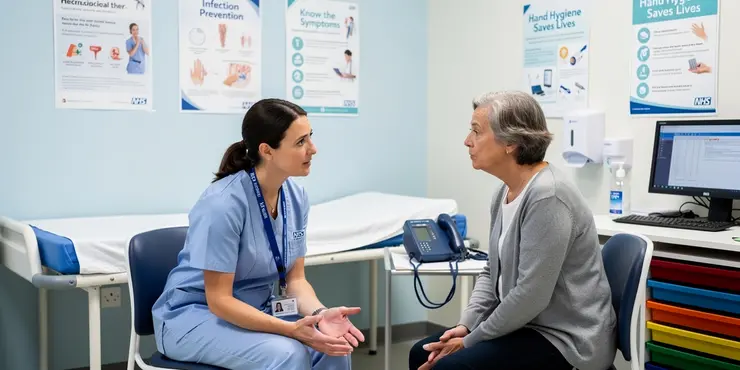
Can Nipah Virus cause neurological complications?
Relevance: 36%
-
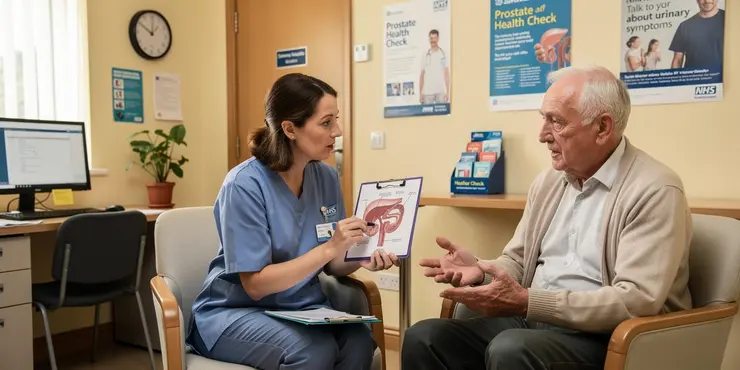
Are there any complications associated with untreated BPH?
Relevance: 36%
-

What are potential complications of nettle rash?
Relevance: 35%
Understanding Shingles and Its Complications
Shingles, also known as herpes zoster, is an infection caused by the varicella-zoster virus, the same virus responsible for chickenpox. After a person has chickenpox, the virus remains dormant in their nervous system and can reactivate later in life, causing shingles. Though shingles itself can be quite painful and uncomfortable, it can also lead to several complications that vary in severity.
Postherpetic Neuralgia (PHN)
One of the most common complications associated with shingles is postherpetic neuralgia (PHN). PHN occurs when the nerve fibres affected by the shingles continue to cause pain even after the rash has cleared. This persistent pain can be debilitating and might last for months or even years. People over the age of 50 are at a higher risk of developing PHN, and the risk increases with age. Effective management and treatment can help reduce the impact on quality of life.
Vision Problems
Shingles can also affect the eyes, leading to complications known as herpes zoster ophthalmicus. If shingles involves the ophthalmic nerve, it can cause inflammation of the eye, leading to conditions such as keratitis, uveitis, or increased intraocular pressure. In severe cases, it can result in vision loss. It is crucial to seek prompt medical attention if shingles affects the area around the eyes to mitigate these risks.
Skin Infections
The blisters associated with shingles can become infected with bacteria, leading to further complications. Secondary bacterial skin infections not only exacerbate pain and inflammation but also prolong the healing process. Proper care and hygiene of the rash, along with timely medical treatment, can help prevent these infections.
Neurological Complications
In some cases, shingles can cause neurological problems. These may include encephalitis, an inflammation of the brain; myelitis, an inflammation of the spinal cord; or cranial nerve palsies, which can lead to difficulties in moving certain facial muscles. Although these complications are less common, they can have serious consequences and require immediate medical intervention.
Prevention and Vaccination
To reduce the likelihood of complications from shingles, vaccination is available in the UK. The shingles vaccine is offered to people in their 70s to prevent the onset of the illness or reduce its severity. Vaccination can significantly decrease the incidence of postherpetic neuralgia and other complications, improving overall outcomes for older adults. It's advisable to consult healthcare providers about vaccination options.
Conclusion
While shingles can resolve without major issues, potential complications necessitate vigilance and prompt treatment. Understanding these complications and taking preventive measures, such as vaccination, can greatly reduce the risks associated with shingles. Those experiencing symptoms of shingles or its complications should seek medical advice to ensure appropriate management.
Understanding Shingles and Its Problems
Shingles is an illness that comes from a virus. This virus is the same one that causes chickenpox, a sickness with spots and bumps. After you have chickenpox, the virus stays hidden in your body. It can come back when you are older and cause shingles. Shingles can hurt a lot and cause many problems.
Long-Lasting Pain After Shingles
Some people get pain that won't go away after shingles. This is called postherpetic neuralgia (PHN). Even when the rash is gone, the pain from PHN can last a long time, like months or years. People who are older than 50 are more likely to have this pain. Doctors can help with treatments to make it better.
Eye Problems
Shingles can also hurt your eyes. If shingles gets near your eyes, it can make them red and sore. This can cause other eye problems or even make you lose your sight if not treated. It's very important to see a doctor if shingles is near your eyes.
Infected Skin
Shingles can make blisters on your skin. These blisters can get germs in them and become infected. This can make the pain and healing worse. Keeping the rash clean and going to the doctor can stop infections.
Problems with the Brain and Nerves
Sometimes, shingles can cause problems in your brain and nerves. This doesn't happen often, but it can be serious. Problems can include swelling in the brain or spinal cord, or trouble moving parts of your face. If this happens, you should get help from a doctor right away.
How to Prevent Shingles
You can get a vaccine to stop shingles. In the UK, people in their 70s can get this vaccine. It helps to stop shingles or make it less bad. The vaccine also helps prevent long-lasting pain like PHN. Talk to your doctor about getting the shingles vaccine.
Conclusion
Shingles can sometimes clear up without causing big problems. But it’s important to know about the problems it can cause and how to prevent them. Vaccination and quick treatment can help a lot. If you think you have shingles, see a doctor. They can give you the right care.
Frequently Asked Questions
What are common complications of shingles?
Common complications of shingles include postherpetic neuralgia, secondary bacterial infections, and temporary or permanent vision problems if the rash occurs near the eyes.
What is postherpetic neuralgia?
Postherpetic neuralgia (PHN) is a complication of shingles characterized by persistent nerve pain in the area where the rash occurred, lasting for months or even years after the rash has healed.
How often does postherpetic neuralgia occur?
The risk of developing PHN increases with age, with about 10-18% of shingles patients experiencing it. It is more common in older adults, especially those over 60.
Can shingles cause vision problems?
Yes, shingles can cause vision problems if the rash involves the eye, leading to conditions like keratitis, uveitis, or even vision loss.
Is scarring a possible complication of shingles?
Yes, scarring can occur if the shingles blisters become infected or if the rash does not heal properly.
Can shingles cause hearing problems?
Yes, shingles can cause hearing problems if it affects the ear, potentially leading to conditions like Ramsay Hunt syndrome.
What is Ramsay Hunt syndrome?
Ramsay Hunt syndrome occurs when shingles affects the facial nerve near the ear, potentially causing facial paralysis and hearing loss.
Are there neurological complications associated with shingles?
Yes, shingles can sometimes lead to neurological complications like encephalitis, meningitis, or peripheral neuropathy.
Can shingles affect the brain?
Though rare, shingles can lead to complications like encephalitis if the virus spreads to the brain.
Is there an increased risk of stroke after shingles?
Studies have shown that there is a temporary increased risk of stroke, especially in the first few weeks after a shingles episode.
Does shingles cause emotional or psychological effects?
Yes, the pain from shingles can lead to emotional distress, anxiety, or depression, especially in those experiencing postherpetic neuralgia.
Can shingles lead to secondary bacterial infections?
Yes, open blisters from the shingles rash can become infected with bacteria, leading to secondary infections requiring antibiotic treatment.
How can you prevent shingles complications?
Early treatment with antiviral medications can reduce the risk of complications. Vaccination with the shingles vaccine can also help prevent shingles and its complications.
Is shingles contagious?
Shingles itself is not contagious, but the virus can be spread to someone who hasn’t had chickenpox or the vaccine, causing them to develop chickenpox.
What should you do if shingles affects the eye?
Seek immediate medical attention if shingles affects the eye, to prevent serious complications like vision loss.
Can children develop complications from shingles?
While rare, children can develop complications such as bacterial infections, particularly if they have a weakened immune system.
Does age affect the risk of complications from shingles?
Yes, older adults are more susceptible to complications like PHN, and their risk of complications generally increases with age.
What is the long-term impact of shingles complications?
Complications like postherpetic neuralgia can lead to chronic pain, affecting quality of life and requiring long-term pain management.
Can the shingles vaccine reduce the risk of complications?
Yes, the shingles vaccine significantly reduces the risk of developing shingles and its associated complications, including postherpetic neuralgia.
What are the signs that shingles complications are developing?
Signs of complications include severe, persistent pain, worsening redness or swelling at the site of the rash, fever, vision changes, or neurological symptoms.
What problems can shingles cause?
Sometimes, shingles can cause other problems. These problems can happen after the rash goes away. They include:
- Pain that lasts a long time, called "postherpetic neuralgia."
- Getting another infection from germs.
- Having trouble with your eyes if the rash is near them, which can sometimes stay forever.
If you find it hard to read, you can try these tools to help:
- Listen to audiobooks to hear the words.
- Use text-to-speech apps that read the text for you.
- Break up the text into small parts and read slowly.
What is postherpetic neuralgia?
Postherpetic neuralgia is a big word for a kind of nerve pain.
It can happen after you have had shingles. Shingles is a painful skin rash.
Not everyone gets this pain after shingles, but some people do.
If you find this hard to read, you can ask someone to help you, or use a tool that reads the text out loud.
Postherpetic neuralgia (PHN) happens after you have shingles. It makes your nerves hurt where you had a rash. The pain can last for a long time, even after the rash is gone.
If you find it hard to read or understand, ask someone to read with you. Using pictures or diagrams can also help you understand better.
How often do people get pain after shingles?
Sometimes, people have pain in their skin after they have had shingles. This pain is called postherpetic neuralgia.
Not everyone gets this pain. Here are some things that might help you:
- Speak to a doctor or nurse if you have questions.
- Using a calendar can help track when you started feeling pain.
- Ask for help from family or friends.
The chance of getting PHN goes up as you get older. About 10 to 18 out of every 100 people who have shingles get PHN. It happens more often in older people, especially those older than 60 years.
Can shingles make it hard to see?
Shingles can sometimes hurt your eyes.
This might make it hard to see clearly.
If you have any problems with your eyes, tell a doctor.
Some helpful things can be:
- Wearing sunglasses to protect your eyes.
- Using eye drops if your eyes feel dry.
Always ask an adult for help if you are worried.
Yes, shingles can hurt your eyes. It can cause problems like making your eyes red and sore, or even make it hard to see.
Can you get scars from shingles?
Yes, scars can happen if the shingles sores get infected or if the rash does not heal well.
Can shingles make it hard to hear?
Yes, shingles can hurt your ears and make it hard to hear. This can sometimes cause a problem called Ramsay Hunt syndrome.
What is Ramsay Hunt syndrome?
Ramsay Hunt syndrome is an illness. It can make your face weak. It can also hurt your ears. It happens when a virus hurts your nerves. It can make it hard to smile or move your face.
If you have this illness, you need to see a doctor. Doctors can help you feel better.
Tools to help you understand better:
- Pictures: Look at pictures to see what happens in Ramsay Hunt syndrome.
- Videos: Watch videos that explain the illness in a simple way.
- Speak with a grown-up: Ask someone you trust to explain it to you.
Ramsay Hunt syndrome happens when a sickness called shingles hurts the nerve in your face near your ear. This can make it hard to move your face and can make it tough to hear.
Can shingles cause problems with the brain and nerves?
Yes, sometimes shingles can cause problems with the brain and nerves. These problems are called encephalitis, meningitis, or peripheral neuropathy.
To help understand, you can use pictures or ask someone to explain it to you.
Can shingles hurt your brain?
Shingles is a sickness from a virus. It can give you a rash and pain.
Sometimes, shingles can make people feel weak or dizzy. It might also give them a headache.
If shingles makes your brain feel funny, tell an adult or a doctor. They can help you feel better.
Tools like picture cards or talking with someone can help you understand if you are unsure.
Sometimes, people who have shingles can get really sick. This is because the virus can move to the brain and cause problems. This problem is called encephalitis. But don't worry, it's very rare.
Can shingles make it more likely to have a stroke?
Shingles is a skin rash that can hurt a lot. It is caused by a virus.
If you have shingles, you might have a higher chance of having a stroke.
If you have had shingles, it is important to talk to a doctor. The doctor can help you stay healthy.
Here are some things that can help you understand:
- Pictures: Look at pictures or drawings about shingles and strokes.
- Talk: Talk to someone you trust about your questions.
- Write: Write down words or draw pictures to help you remember.
Remember, a doctor is the best person to give you advice.
Scientists found that after you have shingles, there is a slightly higher chance of a stroke. This is mostly in the first few weeks after you get shingles.
If reading is hard, you can:
- Read out loud.
- Use your finger to follow the words.
- Ask someone to read with you.
- Take breaks when you need to.
Can shingles make you feel worried or upset?
Yes, having shingles can hurt a lot. This pain can make you feel very sad, worried, or upset. It can be even harder if you have a type of pain called postherpetic neuralgia after the shingles go away.
Can shingles cause other infections from bacteria?
Yes, if you have blisters from shingles, they can get germs and become infected. You might need medicine called antibiotics to help heal the infection.
How can you stop problems from shingles?
Shingles is a painful skin rash. It can cause other health problems. Here is how you can stop those problems:
- Get the shingles vaccine: A vaccine is a medicine that helps stop you from getting sick. Ask your doctor about it.
- See a doctor quickly: If you think you have shingles, go to the doctor right away. They can give you medicine to help.
- Take your medicine: If the doctor gives you medicine, take it exactly as they say.
- Rest and take care of your skin: Try to get lots of rest and keep your rash clean and dry.
These steps can help keep you safe and healthy if you have shingles. If you have questions, you can ask a doctor or nurse.
Getting medicine early can help stop more problems from happening. A vaccine can also help keep you safe from shingles and other problems it can cause.
Can you catch shingles from someone?
Shingles is a sickness that gives a painful skin rash. You can only catch it if you have not had chickenpox before. If the rash touches someone else, they might get chickenpox, not shingles.
Wash your hands and keep the rash covered to help stop spreading it.
Talk to a doctor if you have questions.
Tools to help: You can use pictures or ask someone to read with you.
Shingles cannot be given to someone else. But you can pass the virus to someone who has never had chickenpox or the vaccine. This can make them get chickenpox.
What to do if shingles hurts your eye?
If shingles is near your eye, go to the doctor right away. This can stop big problems like losing your sight.
Can kids have problems from shingles?
It does not happen often, but kids can sometimes get other infections from germs. This is more likely if they are not very strong and healthy.
Does getting older make shingles worse?
Yes, older people can have more problems like PHN. As they get older, they have a bigger chance of having these problems.
Tip: Use large print or audiobooks for easier reading.
What happens if you get problems from shingles for a long time?
- **Shingles can hurt a lot**: Some people feel pain even after the rash goes away. - **Support tools**: - Use ice or a cool cloth to feel better. - Ask someone to help you put on special creams. - **Talk to a doctor**: They can give you medicine to help with pain. - **Relax and rest**: Taking it easy helps your body heal. If you feel worried or scared, tell someone and ask for help.Sometimes, people get a pain that lasts a long time after having a virus called shingles. This pain is called postherpetic neuralgia.
It can make you feel sore for a long time and make it hard to enjoy things.
If you have this pain, you might need help from a doctor to feel better.
Talking to a doctor or using special tools like heat packs can help with the pain.
Can the shingles shot help prevent problems?
A shingles shot can help stop you from getting sick. It can also stop other problems that come from having shingles. Getting this shot can keep you healthy.
Ask a doctor or nurse about the shingles shot. They can tell you how it helps and when you should get it.
It can be helpful to use pictures or videos to explain how the shot works. You can also ask someone to go with you to the doctor to learn more together.
Yes, the shingles shot helps protect you from getting shingles. It also helps stop problems you might get from shingles, like nerve pain.
What are the signs that shingles complications are developing?
Here is how to tell if shingles is getting worse:
- If the pain does not get better after the rash goes away, it can be a sign of a problem.
- If you have a fever or feel very tired, it might mean the shingles is getting worse.
- If the rash is spreading or not going away, it could be a problem.
- If you have trouble seeing or have eye pain, it might be serious.
If you notice any of these signs, tell a doctor or nurse. They can help you feel better.
Using picture charts or asking someone to help read can make this easier. You can also use a magnifying glass to see small words better.
Look out for warning signs like really bad pain that won't go away, redness or swelling getting worse where the rash is, having a fever, any changes in sight, or signs like being confused or dizzy.
Useful Links
This website offers general information and is not a substitute for professional advice.
Always seek guidance from qualified professionals.
If you have any medical concerns or need urgent help, contact a healthcare professional or emergency services immediately.
Some of this content was generated with AI assistance. We’ve done our best to keep it accurate, helpful, and human-friendly.
- Ergsy carfully checks the information in the videos we provide here.
- Videos shown by Youtube after a video has completed, have NOT been reviewed by ERGSY.
- To view, click the arrow in centre of video.
- Most of the videos you find here will have subtitles and/or closed captions available.
- You may need to turn these on, and choose your preferred language.
- Go to the video you'd like to watch.
- If closed captions (CC) are available, settings will be visible on the bottom right of the video player.
- To turn on Captions, click settings .
- To turn off Captions, click settings again.
More Items From Ergsy search
-

Are there any complications associated with shingles?
Relevance: 100%
-

Are there any complications associated with shingles?
Relevance: 100%
-

What is Shingles?
Relevance: 76%
-

What is shingles?
Relevance: 75%
-

Is shingles contagious?
Relevance: 72%
-

How is shingles diagnosed?
Relevance: 71%
-

What are the symptoms of shingles?
Relevance: 71%
-

Is shingles contagious?
Relevance: 70%
-

Can shingles be prevented?
Relevance: 69%
-

What treatments are available for shingles?
Relevance: 69%
-

Can shingles be prevented?
Relevance: 69%
-

What treatments are available for shingles?
Relevance: 68%
-

Is the shingles vaccine safe?
Relevance: 67%
-

Can stress trigger shingles?
Relevance: 65%
-

Who is at risk of developing shingles?
Relevance: 65%
-

Can the shingles vaccine cause chickenpox?
Relevance: 64%
-

At what age should one get the shingles vaccine?
Relevance: 63%
-

What causes shingles?
Relevance: 62%
-

What causes shingles?
Relevance: 62%
-

Can stress trigger shingles?
Relevance: 62%
-

At what age should one get the shingles vaccine?
Relevance: 61%
-

Can the shingles vaccine cause chickenpox?
Relevance: 60%
-

How is shingles diagnosed?
Relevance: 50%
-

What are the complications of chickenpox?
Relevance: 47%
-

Who is at risk of developing shingles?
Relevance: 46%
-

What should I do if I think I have shingles?
Relevance: 45%
-

How long does a shingles outbreak last?
Relevance: 43%
-

How long does a shingles outbreak last?
Relevance: 42%
-

Can measles cause complications?
Relevance: 41%
-

What are the potential complications of appendicitis?
Relevance: 40%
-

Can scabies cause complications?
Relevance: 39%
-

Can meningitis cause long-term complications?
Relevance: 38%
-

What complications are associated with Type 2 Diabetes?
Relevance: 37%
-

Are there any complications associated with Crohn's disease?
Relevance: 37%
-

What complications can arise from measles?
Relevance: 37%
-

What are the complications of sickle cell disease?
Relevance: 36%
-

Who is most at risk for complications from H3N2?
Relevance: 36%
-

Can Nipah Virus cause neurological complications?
Relevance: 36%
-

Are there any complications associated with untreated BPH?
Relevance: 36%
-

What are potential complications of nettle rash?
Relevance: 35%


